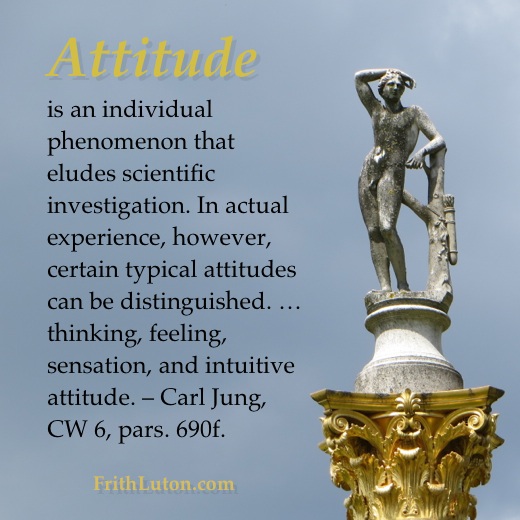Attitude. The readiness of the psyche to act or react in a certain way, based on an underlying psychological orientation.(See also adaptation, type and typology.)
From a great number of existing or possible attitudes I have singled out four; those, namely, that are primarily oriented by the four basic psychological functions: thinking, feeling, sensation, intuition. When any of these attitudes is habitual, thus setting a definite stamp on the character of an individual, I speak of a psychological type. These function-types, which one can call the thinking, feeling, sensation, and intuitive types, may be divided into two classes … the rational and the irrational. … A further division into two classes is permitted by the predominant trend of the movement of libido, namely introversion and extraversion. [“Definitions,” CW 6, par. 835.]
The whole psychology of an individual even in its most fundamental features is oriented in accordance with his habitual attitude. … [which is] a resultant of all the factors that exert a decisive influence on the psyche, such as innate disposition, environmental influences, experience of life, insights and convictions gained through differentiation, collective views, etc. … At bottom, attitude is an individual phenomenon that eludes scientific investigation. In actual experience, however, certain typical attitudes can be distinguished. … When a function habitually predominates, a typical attitude is produced. … There is thus a typical thinking, feeling, sensation, and intuitive attitude. [Ibid., pars. 690f.]
Adaptation to one’s environment requires an appropriate attitude. But due to changing circumstances, no one attitude is permanently suitable. When a particular attitude is no longer appropriate, whether to internal or external reality, the stage is set for psychological difficulties (e.g., an outbreak of neurosis).
For example, a feeling-attitude that seeks to fulfil the demands of reality by means of empathy may easily encounter a situation that can only be solved through thinking. In this case the feeling-attitude breaks down and the progression of libido also ceases. The vital feeling that was present before disappears, and in its place the psychic value of certain conscious contents increases in an unpleasant way; subjective contents and reactions press to the fore and the situation becomes full of affect and ripe for explosions. [“On Psychic Energy,” CW 8, par. 61.]
The tension leads to conflict, the conflict leads to attempts at mutual repression, and if one of the opposing forces is successfully repressed a dissociation ensues, a splitting of the personality, or disunion with oneself. [Ibid.]
© from Daryl Sharp’s Jung Lexicon, reproduced with kind permission of the author.
